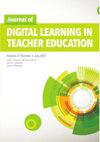虚拟交流体验:为职前教师准备文化多样性
Q1 Social Sciences
Journal of Digital Learning in Teacher Education
Pub Date : 2022-06-20
DOI:10.1080/21532974.2022.2083732
引用次数: 0
摘要
摘要本研究调查了来自美国中西部一所大型大学的36名职前教师的经历,他们参加了为期3周的土耳其同行虚拟交流。从一个批判性的世界主义框架出发,我们以这些经历为中心,分析通过虚拟交流产生的感受、观点、假设和成长。数据是通过期刊收集的,并通过迭代内容分析进行解释。研究结果表明,职前教师及其土耳其同行使用了一系列数字工具来实现教育成果,包括跨文化和个人发现,以及全球互动的专业导向。这些结果还表明,出现了更广泛的紧张局势,包括对同行的一些赤字导向的看法。我们认为,未来的虚拟交流可能受益于一种基于新兴语言、文化间和个人层面的批判性世界主义方法,这种方法可能会对抗霸权主义的立场和态度。本文章由计算机程序翻译,如有差异,请以英文原文为准。
A virtual exchange experience: Preparing pre-service teachers for cultural diversity
Abstract This study examines the experiences of 36 pre-service teachers from a large university in the midwestern U.S who participated in a 3-week virtual exchange with peers in Turkey. Drawing from a critical cosmopolitanism framework, we center these experiences to analyze the feelings, perspectives, assumptions, and growth engendered through the virtual exchange. Data was collected through journals and interpretation developed from an iterative content analysis. Findings suggested that pre-service teachers, and their Turkish peers, used a range of digital tools to lead to educational outcomes, including intercultural and personal discoveries, as well as a professional orientation to global interactions. These outcomes also indicated broader tensions that emerged, including some deficit-oriented perceptions of their peers. We argue that future virtual exchanges might benefit from a critical cosmopolitan approach based on emerging linguistic, intercultural, and intrapersonal dimensions which may counter hegemonic power positions and attitudes.
求助全文
通过发布文献求助,成功后即可免费获取论文全文。
去求助
来源期刊

Journal of Digital Learning in Teacher Education
Social Sciences-Education
CiteScore
4.90
自引率
0.00%
发文量
15
 求助内容:
求助内容: 应助结果提醒方式:
应助结果提醒方式:


